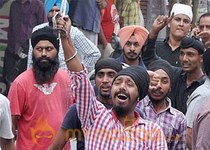The fear of revival of terrorism has started haunting Punjab again. A spate of recent incidents suggests that the sub-surface disquiet over matters religion is getting intense in the state and it might prove conducive to the growth of radicalism.
The tension in the Sikh community has been surfacing with disturbing regularity over the last few months. It started with the controversy over the pardon granted to Dera Sacha Sauda chief Gurmeet Ram Rahim Singh by the SGPC. The issue of desecration of the Guru Granth Sahib and the statewide protests over it followed soon. Then there was the Sarbat Khalsa on November 10, during which radical elements demanded Khalistan. Parties have got into political games now.
On November 21, Punjab Deputy Chief Minister Sukhbir Singh Badal called on President Pranab Mukherjee and accused the Congress of encouraging secessionist forces in the state for petty electoral gains. He accused Rahul Gandhi of “fomenting trouble in Punjab”. Later speaking to the media, Sukhbir charged the Congress leaders with sharing the stage with radical and separatist elements in the November 10 Sarbat Khalsa in Amritsar. He even went to the extent of calling the Congress an anti-national party which was hell-bent on playing divisive politics in Punjab.
The Congress was quick to dismiss his allegations. In a counter-offensive, the party accused Badal of indulging in a malicious and slanderous campaign. The Congress spokesman said that Akalis have a ‘congenital obsession’ of blaming the Congress for every problem in the state. Capt Amarinder Singh, Congress Deputy Leader in Lok Sabha said Badal was trying to shift the blame for his own failures on the Congress.
“The huge turnout of people at Sarbat Khalsa was an expression of anger and outrage at the Badal government and that is the reason Sukhbir is frustrated,’’ said Amarinder.
Trouble began in Punjab a few months ago when the Akal Takht unexpectedly announced pardon to the Dera Sacha chief solely on the basis of a letter written by him. Sikhs asked why he was not even summoned to the Akal Takht. It was said that the Akalis had pressured the SGPC to take the decision.
The Akali Dal is faced with strong anti-incumbency ahead of the assembly elections in early 2017. Lakhs of Dera followers could have come handy for it to beat the challenge from both the Congress and the Aam Aadmi Party.
The Akal Takht later withdrew its pardon in the face of severe all-round criticism. But before the pardon controversy had died down, there were instances of desecration of the holy Guru Granth Sahib in different parts of Punjab. There were large scale protests and anti-government rallies. To control the crowd, the police resorted to firing in one such protest rally, killing two persons. This angered radicals in the Sikh community who called a Sarbat Khalsa near Amritsar.
In a related development, which could be linked to the possible revival of the Khalistani movement, Dal Khalsa released the original Nanakshahi calendar for the New Year at the Operation Bluestar Memorial in the Golden Temple complex in Amritsar in March. The calendar had the photograph of Jarnail Singh Bhindranwale. It also mentioned the death anniversaries of militants who were hanged or killed in ‘police encounters’.
Similarly, on June 5, some Sikh youth defied prohibitory orders to hold protests against the removal of a picture of Bhindranwale before the Operation Bluestar anniversary. The entire region of Jammu had been engulfed in tension as a reason of protest and police action against the protesters.
Indian intelligence agencies had reported in May that banned terrorism outfit, LeT had been training and assisting Khalistani militants in Pakistan. The plan was to send them to J&K from where they could infiltrate Punjab. This was not surprising at all, as three decades ago also, Pakistan had helped the Khalistani uprising in India.
However, some think the Khalistan movement is not at all a real threat now. Talking to Firstpost, Professor (Retd) Manjit Singh of Swaraj Abhiyan, who was earlier a member of the AAP party, said the present serious crisis in Punjab was a result of the interference of politicians in religious matters. Politicians deliberately allow such controversies to divert attention of the people from the real issues like growing unemployment, rise in prices of essential commodities, power shortage, drugs problem in Punjab, sand mining mafia etc.
Lashing out at Sukhbir Singh Badal, Punjab People’s Party (PPP) president Manpreet Singh Badal, said, “Badal is raising the bogey of Khalistan to cover up the failure of Akali government on all fronts. People are so angry with the present government that at many places, Akali leaders have been chased away,” said Manpreet.







